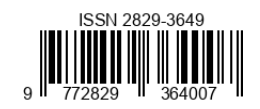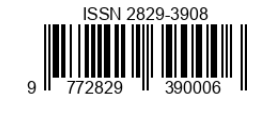The Effect of Problem Based Learning-STEM on Students' 21st Century Skills in Indonesia: A Meta-Analysis
DOI:
https://doi.org/10.56910/literacy.v2i1.550Kata Kunci:
Problem Based Learning, STEM, Learning, 21st Century Skills, Meta-AnalysisAbstrak
21st century skills are skills that must be possessed by students. Students' 21st century skills are still relatively low. Problem-based learning is a learning model that encourages students to improve 21st century skills. Problem based learning-STEM in the process of student learning activities has not run optimally. This study aims to determine the effect of the Problem Based Learning-STEM model on students' 21st century skills. This research is a type of meta-analysis research. The data sources in this study came from 6 national and international journals published in 2015-2023. The process of searching for data sources through Google Scholar, ProQuest, ScienceDirect, Wiley and Eric databases. The database for each study must meet the inclusion and exclusion criteria. The heterogeneity of the data taken was analyzed with the help of the Comprehensive Meta-analysis (CMA) version 3.0 application. Meta-analysis showed an effect size value of 1.45 with very high criteria. This finding shows that the Problem Based Learning-STEM model has a significant effect on students' 21st century skills. This model needs to be applied in every school so that students have 21st century skills.
Referensi
Abdul Rahman; Yayat Suharyat, Ilwandri, T. A. S. A. S. R. G. G. R. P. (2023). Meta-Analisis : Pengaruh Pendekatan STEM berbasis Etnosains Terhadap Kemampuan Pemecahan Masalah dan Berpikir Kreatif Siswa. INNOVATIVE: Journal Of Social Science Research, 3(2), 2111–2125.
Abdul Razak 1, Tomi Apra Santosa2*, Lufri 3, Z. (2021). Meta-Analysis: The Effect of HOTS (Higher Order Thinking Skill) Questions on Students’ Science Literacy Skills and Lesson Study on Ecology and Environmental Materials During the Covid-19 Pandemic Abdul. Bioedusiana: Jurnal Pendidikan Biologi, 6(1), 79–87.
Abdul Razak, Tomi Apra Santosa, Lufri Lufri, & Irdawati Irdawati. (2022). The Influence of the Science Technology Engineering and Mathematics Approach with Mind Maps on the Higher Order Thinking Skills (HOTS) of Students in Biology Learning Class X SMA N 4 Kerinci. International Journal of Education and Literature, 1(2), 77–82. https://doi.org/10.55606/ijel.v1i2.34
Adiwiguna, P. S., Dantes, N., & Gunamantha, I. M. (2019). Pengaruh Model Problem Based Learning (Pbl) Berorientasi Stem terhadap Kemampuan Berpikir Kritis dan Literasi Sains Siswa Kelas V Sd di Gugus I Gusti Ketut Pudja. Jurnal Pendidikan Dasar Indonesia, 3(2), 94–103.
Akcanca, N. (2020). 21st Century Skills: The Predictive Role of Attitudes Regarding STEM Education and Problem-Based Learning. International Journal of Progressive Education, 16(5), 443–458. https://doi.org/10.29329/ijpe.2020.277.27
Akcay, A. O., Semercioglu, M. S., & Güllü, H. (2022). The Relationship between Pre-service Primary School Teachers’ Perception of 21st-Century Skills, Mathematical Literacy Self-Efficiency, and Financial Literacy Attitudes and Behaviors. Mimbar Sekolah Dasar, 9(1), 81–97. https://doi.org/10.53400/mimbar-sd.v9i1.41270
Alfares, N. (2021). The effect of problem-based learning on students’ problem-solving self-efficacy through blackboard system in higher education. International Journal of Education and Practice, 9(1), 185–200. https://doi.org/10.18488/journal.61.2021.91.185.200
Alzahrani, M. A., & Nor, F. M. (2022). Professional Development and Efl Teachers’ Practices in Activating Learners’ Acquisition of 21St Century Skills. Problems of Education in the 21st Century, 80(5), 652–678. https://doi.org/10.33225/pec/22.80.652
Apra Santosa, T., Razak, A., Anhar, A., & Sumarmin, R. (2021). Efektivitas Model Blended Learning Terhadap Hasil Belajar Mahasiswa Pada Mata Kuliah Zoologi di Era Covid-19. Biodik, 7(01), 77–83. https://doi.org/10.22437/bio.v7i01.11708
Apra, T., 1, S., Razak, A., Arsih, F., Sepriyani, E. M., & Hernaya, N. (2021). Meta-Analysis: Science Learning Based on Local Wisdom Against Preserving School Environments During the Covid-19 Pandemic. Journal of Biology Education, 10(2), 244–251. http://journal.unnes.ac.id/sju/index.php/ujbe
Ardiansyah, H., Riswanda, J., & Armanda, F. (2021). Pengaruh Model Pbl Dengan Pendekatan Stem Terhadap Kompetensi Kognitif Peserta Didik Pada Materi Sistem Pencernaan Kelas Xi Di Sma/Ma. Bioilmi: Jurnal Pendidikan, 7(1), 46–51. https://doi.org/10.19109/bioilmi.v7i1.9507
Arisa, S., & Sitinjak, D. S. (2022). Implementation of the STEM-PBL Approach in Online Chemistry Learning and its Impact on Students’ Critical Thinking Skills. Jurnal Pendidikan Kimia Indonesia, 6(2), 88–96. https://doi.org/10.23887/jpki.v6i2.44317
Ariyatun, A., & Octavianelis, D. F. (2020). Pengaruh Model Problem Based Learning Terintegrasi Stem Terhadap Kemampuan Berpikir Kritis Siswa. JEC: Journal of Educational Chemistry, 2(1), 33. https://doi.org/10.21580/jec.2020.2.1.5434
Aspiranti, K. B., & Larwin, K. H. (2021). Investigating the Effects of Tablet-Based Math Interventions: A Meta-Analysis. International Journal of Technology in Education and Science, 5(4), 629–647. https://doi.org/10.46328/ijtes.266
ATABEY, N., & TOPÇU, M. S. (2020). The Relationship between Turkish Middle School Students’ 21st Century Skills and STEM Career Interest: Gender Effect. Journal of Education in Science, Environment and Health, 7(2). https://doi.org/10.21891/jeseh.739586
Baran, M., Baran, M., Karakoyun, F., & Maskan, A. (2021). The Influence of Project-Based STEM (PjbL-STEM) Applications on the Development of 21st-Century Skills. Journal of Turkish Science Education, 18(4), 798–815. https://doi.org/10.36681/tused.2021.104
Benek, I., & Akcay, B. (2022). The effects of socio-scientific STEM activities on 21st century skills of middle school students. Participatory Educational Research, 9(2), 25–52. https://doi.org/10.17275/PER.22.27.9.2
Budiarti, M., Ferguson-patrick, K., & Macqueen, S. (2021). Global Project-Based Learning as an Approach to Teaching the 4Cs in Schools Indonesia Corresponding author : Suzanne.macqueen@newcastle.edu.au © 2012 / 2023 National Council for Social Studies International Assembly Corresponding author : Suzanne.macqueen. Journal of International Social Studies, 11(1), 33–62. http://www.iajiss.org/index.php/iajiss/article/view/609https://www.iajiss.org/index.php/iajiss/article/download/609/431
Chaidam, O., & Poonputta, A. (2022). Learning Achievement Improvement of 1st Grade Students by Using Problem-Based Learning (PBL) on TPACK MODEL. Journal of Education and Learning, 11(2), 43. https://doi.org/10.5539/jel.v11n2p43
Dare, E. A., Keratithamkul, K., Hiwatig, B. M., & Li, F. (2021). Beyond content: The role of stem disciplines, real-world problems, 21st century skills, and stem careers within science teachers’ conceptions of integrated stem education. Education Sciences, 11(11). https://doi.org/10.3390/educsci11110737
Darsani, L. (2019). Penerapan Model Pembelajaran Berbasis Masalah untuk Meningkatkan Hasil Belajar IPA. Journal of Education Actio, 2(3), 377. https://doi.org/10.23887/jp2.v2i3.19293
Deniş Çeliker, H. (2020). The Effects of Scenario-Based STEM Project Design Process with Pre-service Science Teachers: 21st Century Skills and Competencies, Integrative STEM Teaching Intentions and STEM Attitudes. Journal of Educational Issues, 6(2), 451. https://doi.org/10.5296/jei.v6i2.17993
Derya Orhan Göksün 1, A. A. K. (2017). The Relationship Between Pre-Service Teachers’ Use of 21st Century Learner Skills and 21st Century Teacher Skills *. Nature, 120(3012), 105–107. https://doi.org/10.1038/120105a0
Dewi, C. A., Erna, M., Martini, Haris, I., & Kundera, I. N. (2021). Effect of Contextual Collaborative Learning Based Ethnoscience to Increase Student’s Scientific Literacy Ability. Journal of Turkish Science Education, 18(3), 525–541. https://doi.org/10.36681/tused.2021.88
do Amaral, J. A. A., & Fregni, F. (2021). Fostering system thinking learning by combining problem-based learning and simulation-based learning approaches. International Journal of Instruction, 14(3), 1–16. https://doi.org/10.29333/iji.2021.1431a
Drew, J. C., Oli, M. W., Rice, K. C., Ardissone, A. N., Galindo-Gonzalez, S., Sacasa, P. R., Belmont, H. J., Wysocki, A. F., Rieger, M., & Triplett, E. W. (2015). Development of a distance education program by a land-grant university augments the 2-year to 4-year STEM pipeline and increases diversity in STEM. PLoS ONE, 10(4), 1–16. https://doi.org/10.1371/journal.pone.0119548
Elfira, I., & Santosa, T. A. (2023). Literature Study : Utilization of the PjBL Model in Science Education to Improve Creativity and Critical Thinking Skills. Jurnal Penelitian Pendidikan IPA, 9(1), 133–143. https://doi.org/10.29303/jppipa.v9i1.2555
Erol, H. (2021). Reflections on the 21st Century Skills into the Curriculum of Social Studies Course. International Journal of Education and Literacy Studies, 9(2), 90. https://doi.org/10.7575/aiac.ijels.v.9n.2p.90
Farisi, A., Hamid, A., & Melvina. (2017). Pengaruh Model Pembelajaran Problem Based Learning TerhadapKemampuan Berpikir Kritis Dalam Meningkatkan Hasil BelajarSiswa Pada Konsep Suhu Dan Kalor. Jurnal Ilmiah Mahasiswa (JIM) Pendidikan Fisika, 2(3), 283–287.
Febrianto, T., Ngabekti, S., & Saptono, S. (2021). The Effectiveness of Schoology-Assisted PBL-STEM to Improve Critical Thinking Ability of Junior High School Students. Journal of Innovative Science Education, 10(2), 222–229. https://journal.unnes.ac.id/sju/index.php/jise/article/view/42993
Fradila, E., Razak, A., Santosa, T. A., Arsih, F., & Chatri, M. (2021). Development Of E-Module-Based Problem Based Learning (PBL) Applications Using Sigil The Course Ecology And Environmental Education Students Master Of Biology. International Journal of Progressive Sciences and Technologies (IJPSAT, 27(2), 673–682. http://ijpsat.ijsht-journals.org
Hadi, F. R. (2021). Efektifitas Model Pbl Terintegrasi STEM Terhadap Kemampuan Berpikir Kritis Matematis Siswa Kelas V SD. Jurnal Pendidikan Tambusai, 5(3), 6644–6649. https://doi.org/10.31004/jptam.v5i3.2005
Hamzah, Tambak, S., Hamzah, M. L., Purwati, A. A., Irawan, Y., & Umam, M. I. H. (2022). Effectiveness of Blended Learning Model Based on Problem-Based Learning in Islamic Studies Course. International Journal of Instruction, 15(2), 775–792. https://doi.org/10.29333/iji.2022.15242a
Hite, R. L., & Spott, J. L. (2022). Improving Parents’ and Teachers’ Perceptions of Girls’ STEM Activities and Interests Before and After an Informal STEM Intervention. The Journal of STEM Outreach, 5(1). https://doi.org/10.15695/jstem/v5i1.01
Hujjatusnaini, N., Corebima, A. D., Prawiro, S. R., & Gofur, A. (2022). the Effect of Blended Project-Based Learning Integrated With 21St-Century Skills on Pre-Service Biology Teachers’ Higher-Order Thinking Skills. Jurnal Pendidikan IPA Indonesia, 11(1), 104–118. https://doi.org/10.15294/jpii.v11i1.27148
Ichsan, Tomi Apra Santosa, Ilwandri, Aulia Sofianora, U. Y. (2022). Efektivitas Evaluasi Model CIPP Dalam Pembelajaran IPA di Indonesia : Meta- Analisis. Jurnal Pendidikan Dan Konseling, 5(2), 1349–1358.
Ichsan, Yayat Suharyat, Tomi Apra Santosa, E. (2023). The Effectiveness of STEM-Based Learning in Teaching 21 st Century Skills in Generation Z Student in Science Learning : A. Jurnal Penelitian Pendidikan IPA, 9(1), 150–166. https://doi.org/10.29303/jppipa.v9i1.2517
Iolanessa, L., Kaniawati, I., & Nugraha, M. G. (2020). Pengaruh Model Problem Based Learning (PBL) Menggunakan Pendekatan STEM dalam Meningkatkan Keterampilan Pemecahan Masalah Siswa SMP. WaPFi (Wahana Pendidikan Fisika), 5(1), 113–117.
Isatunada*, A., & Haryani, S. (2021). Development of Science Learning Tools using the STEM Approach to Train Problem Solving Ability and Students Activeness in Global Warming Material. Jurnal Pendidikan Sains Indonesia, 9(3), 363–375. https://doi.org/10.24815/jpsi.v9i3.19599
Kaçar, T., Terzi, R., Arıkan, İ., & Kırıkçı, A. C. (2021). The Effect of Inquiry-Based Learning on Academic Success: A Meta-Analysis Study. International Journal of Education and Literacy Studies, 9(2), 15. https://doi.org/10.7575/aiac.ijels.v.9n.2p.15
Karatas, K., & Arpaci, I. (2021). The role of self-directed learning, metacognition, and 21st century skills predicting the readiness for online learning. Contemporary Educational Technology, 13(3). https://doi.org/10.30935/cedtech/10786
Komasawa, N., Berg, B. W., & Minami, T. (2018). Problem-based learning for anesthesia resident operating room crisis management training. PLoS ONE, 13(11), 1–10. https://doi.org/10.1371/journal.pone.0207594
Kulakoglu, B., & Kondakci, Y. (2023). STEM Education as a Concept Borrowing Issue: Perspectives of School Administrators in Turkey. ECNU Review of Education, 6(1), 84–104. https://doi.org/10.1177/20965311221107390
Laksmi, M. L., Sari, D. P., Rinanto, Y., & Sapartini, R. R. (2021). Implementation of problem based learning to increase scientific explanation skill in biology learning about the environment. Journal of Learning for Development, 8(3), 532–540. https://doi.org/10.56059/jl4d.v8i3.531
M. Karim , Syafrul Antoni2, Karlini Oktarina3, T. A. S. (2022). The Effect of Teacher Professionalism in Islamic Religious Education in the Era of Society 5.0 in Indonesia: A Meta-Analysis. Jurnla Pendidikan Dan Konseling, 5(2), 1349–1358.
Maghfiroh, N., Susilo, H., & Gofur, A. (2016). Pengaruh Project Based Learning Terhadap Keterampilan Proses Sains Siswa Kelas X Sma Negeri Sidoarjo. Jurnal Pendidikan, 1(8), 1588—1593.
Manuaba, I. B. A. P., No, Y., & Wu, C. C. (2022). The effectiveness of problem based learning in improving critical thinking, problem-solving and self-directed learning in first-year medical students: A meta-analysis. PLoS ONE, 17(11 November), 1–12. https://doi.org/10.1371/journal.pone.0277339
Mıhladız Turhan, G., & Açık Demirci, I. (2021). What Are the 21st-Century Skills for Pre-service Science and Mathematics Teachers: Discussion in the Context of Defined 21st-Century Skills, Self-skills and Education Curricula. Journal of Educational Issues, 7(1), 92. https://doi.org/10.5296/jei.v7i1.18278
Mirici, İ. H., & Ataberk, B. (2014). an Investigation of the 21St Century Skills in English Language Teaching (Elt) Programs in Turkey. Journal of Education and Teaching (IOJET), ISSN, 2148–2225. https://orcid.org/0000-0002-0906-0259
Munawwarah, M., Laili, N., & Tohir, M. (2020). Keterampilan Berpikir Kritis Mahasiswa Dalam Memecahkan Masalah Matematika Berdasarkan Keterampilan Abad 21. Alifmatika: Jurnal Pendidikan Dan Pembelajaran Matematika, 2(1), 37–58. https://doi.org/10.35316/alifmatika.2020.v2i1.37-58
Musna, R. R., Juandi, D., & Jupri, A. (2021). A meta-analysis study of the effect of Problem-Based Learning model on students’ mathematical problem solving skills. Journal of Physics: Conference Series, 1882(1). https://doi.org/10.1088/1742-6596/1882/1/012090
Muzana, S. R., Jumadi, Wilujeng, I., Yanto, B. E., & Mustamin, A. A. (2021). E-STEM project-based learning in teaching science to increase ICT literacy and problem solving. International Journal of Evaluation and Research in Education, 10(4), 1386–1394. https://doi.org/10.11591/IJERE.V10I4.21942
Noble, E., Ferris, K. A., LaForce, M., & Zuo, H. (2020). A Mixed-Methods Approach to Understanding PBL Experiences in Inclusive STEM High Schools. European Journal of STEM Education, 5(1), 02. https://doi.org/10.20897/ejsteme/8356
Novitra, F., Festiyed, Yohandri, & Asrizal. (2021). Development of Online-based Inquiry Learning Model to Improve 21st-Century Skills of Physics Students in Senior High School. Eurasia Journal of Mathematics, Science and Technology Education, 17(9), 1–20. https://doi.org/10.29333/ejmste/11152
OK, G., & KAYA, D. (2021). The Relationship between Middle School Students’ Levels of 21st Century Learning Skills and Their Interest in STEM Career. Acta Didactica Napocensia, 14(2), 333–345. https://doi.org/10.24193/adn.14.2.24
Oktarina, K., Suhaimi, S., Santosa, T. A., & ... (2021). Meta-Analysis: The Effectiveness of Using Blended Learning on Multiple Intelligences and Student Character Education During the Covid-19 Period. … Journal of Education …, 4(3), 184–192. http://journal.ummat.ac.id/index.php/IJECA/article/view/5505https://journal.ummat.ac.id/index.php/IJECA/article/download/5505/pdf
Öztürk, Ö. T. (2023). Examination of 21st Century Skills and Technological Competences of Students of Fine Arts Faculty. International Journal of Education in Mathematics, Science and Technology, 11(1), 115–132. https://doi.org/10.46328/ijemst.2931
Parno, Yuliati, L., & Ni’Mah, B. Q. A. (2019). The influence of PBL-STEM on students’ problem-solving skills in the topic of optical instruments. Journal of Physics: Conference Series, 1171(1). https://doi.org/10.1088/1742-6596/1171/1/012013
Perdana, R., Apriani, A. N., Richardo, R., Rochaendi, E., & Kusuma, C. (2021). Elementary students’ attitudes towards STEM and 21st-century skills. International Journal of Evaluation and Research in Education, 10(3), 1080–1088. https://doi.org/10.11591/IJERE.V10I3.21389
Puspitasari, E. (2020). Project-based Learning Implementation to Cultivate Preservice English Teachers’ 21st Century Skills. IJELTAL (Indonesian Journal of English Language Teaching and Applied Linguistics), 5(1), 191. https://doi.org/10.21093/ijeltal.v5i1.638
Putranta et al. (2021). The Effect of Smartphones Usability on High School Students’ Science Literacy Ability in Physics Learning. European Journal of Educational Research, 9(1), 331–349.
Putri, C. D., Pursitasari*, I. D., & Rubini, B. (2020). Problem Based Learning Terintegrasi STEM Di Era Pandemi Covid-19 Untuk Meningkatkan Keterampilan Berpikir Kritis Siswa. Jurnal IPA & Pembelajaran IPA, 4(2), 193–204. https://doi.org/10.24815/jipi.v4i2.17859
Rahman, A., Santosa, T. A., Sofianora, A., Oktavianti, F., & Alawiyah, R. (2023). Systematic Literature Review : TPACK-Integrated Design Thinking in Education. International Journal of Education and Literature (IJEL), 2(1), 65–77.
Rahman, A., Santosa, T. A., Suharyat, Y., & Aprilisia, S. (2023). The Effectiveness of AI Based Blended Learning on Student Scientific Literacy : LITERACY : International Scientific Journals Of Social, Education and Humaniora, 2(1).
Rais, M., Makassar, U. N., Education, A. T., Street, P., Yahya, M., Makassar, U. N., Education, A. E., Street, A. P. P., Makassar, U. N., Education, A. T., Street, P., Makassar, U. N., Education, E. E., Street, P., Planning, H. E., & Board, C. (2021). Comparing project-based learning and problem-based learning to foster 21st-century learning skills in agricultural seaweed product Muhammad. Cypriot Journal of Educational Sciences, 16(3), 1217–1230.
Ridwan, M. R., Retnawati, H., Hadi, S., & Jailani, J. (2021). The Effectiveness of Innovative Learning on Mathematical Problem-Solving Ability: A Meta-Analysis. International Journal of Research in Education and Science, 7(3), 910–932. https://doi.org/10.46328/ijres.2287
Rizaldi, D. R., Nurhayati, E., & Fatimah, Z. (2020). The Correlation of Digital Literation and STEM Integration to Improve Indonesian Students’ Skills in 21st Century. International Journal of Asian Education, 1(2), 73–80. https://doi.org/10.46966/ijae.v1i2.36
ŞAHİN, H. (2021). The Effect os Stem-Based Education Program on Problem Solving Skills of Five Year Old Children. Malaysian Online Journal of Educational Technology, 9(4), 68–87. https://doi.org/10.52380/mojet.2021.9.4.325
Salikha, U. A., Sholihin, H., & Winarno, N. (2021). The influence of STEM project-based learning on students’ motivation in heat transfer learning. Journal of Physics: Conference Series, 1806(1). https://doi.org/10.1088/1742-6596/1806/1/012222
Santosa, T. A., Putri, R. D. S. H., Sumarmin, R., Putri, D. H., & Razak, A. (2021). Meta-Analysis: Effectiveness of artificial feeding to increase growth rate and reproduction quality of Monopterus albus species. Jurnal Biologi Udayana, 25(1), 95. https://doi.org/10.24843/jbiounud.2021.v25.i01.p11
Santosa, T. A., Razak, A., Lufri, L., Zulyusri, Z., Fradila, E., & Arsih, F. (2021). Meta-Analisis: Pengaruh Bahan Ajar Berbasis Pendekatan STEM Pada Pembelajaran Ekologi. Journal of Digital Learning and Education, 1(01), 1–9. https://doi.org/10.52562/jdle.v1i01.24
Santosa, T. A., & S., E. M. (2020). Analisis Masalah Pendidikan Biologi Pada Sekolah Menengah Pertama Di Era Pandemi Covid -19. Jurnal Review Pendidikan Dan Pengajaran, 3(2), 273–278. https://doi.org/10.31004/jrpp.v3i2.1278
Santosa, T. A., Sepriyani, E. M., Lufri, L., & Zulyusri, Z. (2021). Meta-Analysis: Penggunaan Modul Berbasis Hots Pada Materi Ekologi Dan Lingkungan Di Sma. Jurnal Eduscience, 8(1), 53–56. https://doi.org/10.36987/jes.v8i1.1976
SANTOSA, T. A., & YULIANTI, S. (2020). Pengaruh Pemberian Kuis Terhadap Peningkatan Motivasi Belajar Biologi Siswa Di Sma Negeri 7 Kerinci. Edusaintek : Jurnal Pendidikan, Sains Dan Teknologi, 7(2), 1–18. https://doi.org/10.47668/edusaintek.v7i2.58
Sari, Y. I., Sumarmi, Utomo, D. H., & Astina, I. K. (2021). The Effect of Problem Based Learning on Problem Solving and Scientific Writing Skills. International Journal of Instruction, 14(2), 11–26. https://doi.org/10.29333/iji.2021.1422a
Semilarski, H., Soobard, R., & Rannikmäe, M. (2021). Promoting students’ perceived self-efficacy towards 21st century skills through everyday life-related scenarios. Education Sciences, 11(10). https://doi.org/10.3390/educsci11100570
Setyaningsih, E., Agustina, P., Anif, S., Ahmad, C. N. C., Sofyan, I., Saputra, A., Salleh, W. N. W. M., Shodiq, D. E., Rahayu, S., & Hidayat, M. L. (2022). PBL-STEM Modul Feasibility Test for Preservice Biology Teacher. Indonesian Journal on Learning and Advanced Education (IJOLAE), 4(2), 118–127. https://doi.org/10.23917/ijolae.v4i2.15980
Shamdas, G., Bialangi, M., & Buntu, A. (2023). Application of Problem-Based Learning Model STEM-Based on Biology Lessons for High School Students Communication Skills. 11(2), 345–359.
Simanjuntak, M. P., Hutahaean, J., Marpaung, N., & Ramadhani, D. (2021). Effectiveness of problem-based learning combined with computer simulation on students’ problem-solving and creative thinking skills. International Journal of Instruction, 14(3), 519–534. https://doi.org/10.29333/iji.2021.14330a
Sofianora, A., Suharyat, Y., & Santosa, T. A. (2023). PENGARUH PROFESIONALITAS GURU MATEMATIKA DALAM MENINGKATKAN KOMPETENSI SISWA ERA REVOLUSI INDUSTRI 5 . 0 DI INDONESIA : SEBUAH META-ANALISIS. Jurnal MATH-UMB.EDU, 10(2), 49–58.
Sousa, M. J., & Costa, J. M. (2022). Discovering Entrepreneurship Competencies through Problem‐Based Learning in Higher Education Students. Education Sciences, 12(3). https://doi.org/10.3390/educsci12030185
Suhaimi, Santosa, T. A., & Aprilisia, S. (2022). Analisis Pendekatan Saintifik Dalam Pembelajaran IPA Selama Pandemi Covid-19 di Sekolah Dasar. Jurnal Didika: Wahana Ilmiah Pendidikan Dasar, 8(1), 92–101.
Suharyat, Y., Santosa, T. A., & Satria, E. (2023). The Effectiveness of STEM-Based Learning in Teaching 21 st Century Skills in Generation Z Student in Science Learning : A. Jurnal Penelitian Pendidikan IPA, 9(1), 161–166. https://doi.org/10.29303/jppipa.v9i1.2517
Suharyat, Y., Santosa, T. A., Yulianti, S., & Amalia, K. N. (2022). International Journal of Education and Literature ( IJEL ) Literature Review : TPACK-Based Science Learning in Supporting Teacher Quality in Indonesia. 2014–2020.
Sumarni, W., Faizah, Z., Subali, B., Wiyanto, W., & Ellianawati. (2020). The urgency of religious and cultural science in stem education: A meta data analysis. International Journal of Evaluation and Research in Education, 9(4), 1045–1054. https://doi.org/10.11591/ijere.v9i4.20462
Suparman, Juandi, D., & Tamur, M. (2021a). Problem-Based Learning for Mathematical Critical Thinking Skills : A Meta-Analysis. Journal of Hunan University (Natural Sciences), 48(2), 133–144.
Suparman, S., Juandi, D., & Tamur, M. (2021b). Does Problem-Based Learning Enhance Students’ Higher Order Thinking Skills in Mathematics Learning? A Systematic Review and Meta-Analysis. ACM International Conference Proceeding Series, April, 44–51. https://doi.org/10.1145/3451400.3451408
Supriyadi, A., Satria, E., & Santosa, T. A. (2022). International Journal of Education and Literature ( IJEL ) E- ISSN : 2829-6249 P -ISSN : 2829-6656 Meta-analysis : The Effectiveness of the Integrated STEM Technology Pedagogical Content Knowledge Learning Model on the 21st Century Skills of High School S. International Journal of Education and Literature (IJEL).
Supriyadi, A., Suharyat, Y., Santosa, T. A., & Sofianora, A. (2023). The Effectiveness of STEM-Integrated Blended Learning on Indonesia Student Scientific Literacy : A Meta-analysis. International Journal of Education and Literature (IJEL), 2(1), 41–48.
Thorndahl, K. L., & Stentoft, D. (2020). Thinking critically about critical thinking and prob-lem-based learning in higher education: A scoping review. Interdisciplinary Journal of Problem-Based Learning, 14(1), 1–21. https://doi.org/10.14434/ijpbl.v14i1.28773
van Laar, E., van Deursen, A. J. A. M., van Dijk, J. A. G. M., & de Haan, J. (2020). Determinants of 21st-Century Skills and 21st-Century Digital Skills for Workers: A Systematic Literature Review. SAGE Open, 10(1). https://doi.org/10.1177/2158244019900176
Viro, E., Lehtoncn, D., Joutscnlahti, J., & Tahvanainen, V. (2020). Teachers’ perspectives on project-based learning in mathematics and science. European Journal of Science and Mathematics Education, 8(1), 12–31. https://doi.org/10.30935/scimath/9544
Waters, C. C., & Orange, A. (2022). STEM-driven school culture: Pillars of a transformative STEM approach. Journal of Pedagogical Research, 6(2), 72–90. https://doi.org/10.33902/jpr.202213550
Widodo, S., & Kusuma Wardani, R. (2020). Mengajarkan Keterampilan Abad 21 4C (Communication, Collaboration, Critical Thinking and Problem Solving, Creativity and Innovation) Di Sekolah Dasar. MODELING: Jurnal Program Studi PGMI, 7(2), 187.
Wilson, C., Campbell-Gulley, B., Anthony, H. G., Pérez, M., & England, M. P. (2022). Integrated STEM Education: A Content Analysis of Three STEM Education Research Journals. International Journal of Technology in Education and Science, 6(3), 388–409. https://doi.org/10.46328/ijtes.371
WINARNI, E. W., KARPUDEWAN, M., KARYADI, B., & GUMONO, G. (2022). Integrated PjBL-STEM in Scientific Literacy and Environment Attitude for Elementary School. Asian Journal of Education and Training, 8(2), 43–50. https://doi.org/10.20448/edu.v8i2.3873
Wong, S. S. H., Kim, M., & Jin, Q. (2021). Critical Literacy Practices Within Problem-Based Learning Projects in Science. Interchange, 52(4), 463–477. https://doi.org/10.1007/s10780-021-09426-4
Worapun, W., Khamdit, S., & Siridhrungsri, P. (2022). Teacher Perceptions toward Professional Learning Community on the Development of Thai Students’ 21st Century Skills. Journal of Educational Issues, 8(1), 59. https://doi.org/10.5296/jei.v8i1.19485
Yang, J. L., & McKenzie, S. (2018). Using Career Development Learning in Science and Information Technology Courses to Build 21st-Century Learners. Journal of Continuing Higher Education, 66(3), 137–145. https://doi.org/10.1080/07377363.2018.1525789
Yayat Suharyat et al. (2022). Meta-Analisis Penerapan Model Pembelajaran Problem Based Learning Untuk Meningkatkan Ketrampilan Abad-21 Siswa Dalam Pembelajaran IPA Universitas Pahlawan Tuanku Tambusai. Jurnal Pendidikan Dan Konseling, 4(5), 5081–5088.
Zulkifli, Z., Satria, E., Supriyadi, A., & Santosa, T. A. (2022). Meta-analysis : The effectiveness of the integrated STEM technology pedagogical content knowledge learning model on the 21st century skills of high school students in the science department. Psychology, Evaluation, and Technology in Educational Research, 5(1), 32–42.
Zulyusri el at. (2020). Problematika Dalam Pembelajaran Berbasis Virtual Learning Environmen t ( VLE ) Terhadap Siswa dan Guru SMA / MA Pada Materi Biologi. Journal of Education, 03(01), 93–103.







